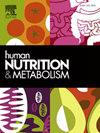硫微生物饮食评分与溃疡性结肠炎严重程度之间存在关联:一项横断面研究的结果
IF 1.8
Q3 ENDOCRINOLOGY & METABOLISM
引用次数: 0
摘要
考虑到饮食和微生物组在调节溃疡性结肠炎(UC)患者疾病的严重程度和进展中的关键作用,我们进行了一项横断面研究,以阐明硫微生物饮食(SMD)评分与UC临床病程之间的联系。方法纳入158例UC患者。一位胃肠病学专家使用梅奥评分报告了疾病的严重程度。一位营养专家通过有效的食物频率问卷(FFQ)记录了168种食物的摄入量和频率。采用Nguyen等人介绍的方法计算SMD评分。通过调整饮食因素、人口统计学值和生活方式因素的logistic回归分析疾病严重程度与适应性SMD评分之间的关系。结果参与者的平均年龄为42.52±12.61岁,除蛋白质摄入量外,不同SMD评分类别患者的基线信息无显著差异。除了加工肉类外,所有成分的膳食摄入量在适应SMD评分的各分位数之间存在显著差异(p = 0.97)。在完全调整后的模型中,调整后的SMD评分的第三分位数患者患严重疾病的几率是第一分位数患者的4.29倍(OR: 4.29, 95% CI: 1.42, 12.91)。结论适应性SMD评分越高,UC的严重程度越高。然而,由于本研究的局限性,需要进行更多考虑不同混杂因素的纵向和临床试验来完善这一结论。本文章由计算机程序翻译,如有差异,请以英文原文为准。
There was an association between sulfur microbial diet score and ulcerative colitis severity: the result of a cross-sectional study
Background
Considering the pivotal role of diet and microbiome in modulating the disease's severity and progression in patients with ulcerative colitis (UC), we performed a cross-sectional study to elucidate the link between the Sulfur microbial diet (SMD) score and the clinical course of UC.
Methods
158 patients with UC were enrolled. An expert gastroenterologist reported the disease severity using the Mayo score. An expert nutritionist recorded the amount and frequency of intake of 168 food items by the valid Food Frequency Questionnaire (FFQ). The method introduced by Nguyen et al. was used to calculate SMD score. The association between disease severity and adapted SMD score was analyzed by the logistic regression adjusting for dietary factors, demographic values, and lifestyle factors.
Results
The mean age of participants was 42.52 ± 12.61 years old and there were no significant differences in baseline information of patients in different adapted SMD score tertiles except for protein intake. There were significant differences in dietary intake of all components across the tertile of the adapted SMD score except for processed meat (p = 0.97). In the fully adjusted model, the odds of severe disease were 4.29 times higher in the patients in the third tertile of the adapted SMD score compared with the first tertile (OR: 4.29, 95 %CI: 1.42, 12.91).
Conclusions
The higher score of adapted SMD was associated with higher severity of UC. However, due to the limitations of this study, more longitudinal and clinical trials considering the different confounders should be undertaken to improve this conclusion.
求助全文
通过发布文献求助,成功后即可免费获取论文全文。
去求助
来源期刊

Human Nutrition and Metabolism
Agricultural and Biological Sciences-Food Science
CiteScore
1.50
自引率
0.00%
发文量
30
审稿时长
188 days
 求助内容:
求助内容: 应助结果提醒方式:
应助结果提醒方式:


